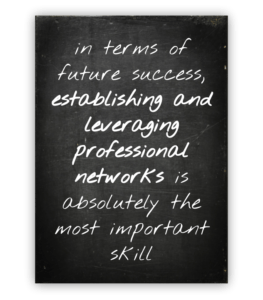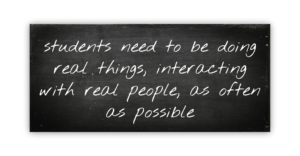
My Premise
In a recent blog post by Jill Schleshinger (Business Analyst for CBS News), “Is College Worth It?”, Jill briefly reflects on the advantages of prestigious colleges. In a word, the advantage is network. The most profound comment she makes, however, is a brief note in passing. Referencing her own book, entitled The Dumb Things Smart People Do with Their Money, she writes, “Here’s the dirty little secret we rarely admit: Most smart, successful parents already have networks their kids can access, so it would behoove them to spend time selecting colleges that are affordable.”
Do not miss the essential lesson for educators here. Combine her comments about the doors colleges open because of networks and the fact that many families (with “smart, successful parents”) establish their own networks. The clear implication is that establishing and leveraging networks is vital.
I am going to make the argument that this is a skill that can be cultivated and is not only entirely absent from nearly all aspects of K-12 education today, but it is also perhaps the single most valuable skill in ensuring lasting future success. (Side note: a GREAT read that aligns with this topic is The Proximity Principle by Ken Coleman.)
My Argument
With everything that has been written in the last 15 years about things like soft skills, employability skills, 21st century skills, etc., it is clear that a focus on developing certain dynamic skills is imperative in education. Consult any one of those lists, and the overlap is obvious. There is a fairly short list of what we believe to be the most important skills in any kind of adult experience, be it workplace or community or public service.
Those skills are that which tends to make an individual more effective in that role.
However, before that role is gained, one skill invariably trumps the others. Networking.
The most obvious reason is that establishing and leveraging a network is the most effective way to earn employment. We like to say, “It’s not what you know but who you know” (research the origins of that phrase for an interesting etymological journey). I might propose that so long as other important skills are no more than passable, a strong network will always produce greater future success than, say, an incredibly skilled individual with little or no network.
Obvious realities aside, my point is that if we know this to be true, then in truth, if our concern is for the long-term success of our students (whatever their future endeavors), I would argue that we need to devote far more attention to networking at far earlier ages.
Consider a 2013 study conducted by Kaufman, Hirudayaraj, and Hagler. Motivated by the fact that college graduates were struggling to find employment, they attempted to discover the benefits of an intentional professional networking focus in a business class. On the one side, students “seemed to have gained a better understanding of the reality of the job market, the process of job search, and the possible means of entry and growth within an industry of their choice.” Additionally, the authors noted that several students unintentionally produced summer jobs and internships as a result of the experience.
Now I ask the question: why can’t we do that more in K-12 education?
After all, it’s super easy. Consider
- this example (high school econ class connects with local businesses) or
- this example (high school life skills/food class designs school lunch menu) or
- this example (high school industrial tech class builds equipment, tours facilities) or
- this example (high school leadership class positively impacts community) or
- this example (experiences and community in education).
Here’s the point: students need to be doing real things, interacting with real people, as often as possible from as young an age as appropriate with intent and purpose.
Most of our students will not attend a “brand-name college”, as Jill phrases it, or have well-networked parents/families who understand how to leverage that network. But they do have access to free public education with enormous amounts of time and space available for doing things like establishing and learning to leverage a network of their own.
That is the difference maker. I’m not suggesting it is the only important thing about K-12 education. I am suggesting, however, that in terms of future success, establishing and leveraging professional networks is absolutely the most important skill.
Interested? Read These
Want to dive into networking in your classroom? Here’s a great resource: Teaching Networking Skills: Paving a Way to Jobs and Careers.
Also, you should probably read this (title is self-explanatory): Reinforcements: How to get people to help you



